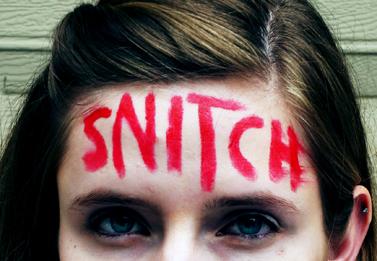 Students battle a culture of peer pressure, complacency when reporting peers to authorities
Students battle a culture of peer pressure, complacency when reporting peers to authorities

It’s been awhile since kindergarten, but some of us still despise the tattle tale. And as high schoolers, we may be even more inclined to keep our heads down and our mouths shut. Yet, as the crimes and consequences become more serious, and especially if they involve our friends, are we responsible for reporting the bad behavior of others? Can there ever really be an “innocent” bystander?
Many students grew up believing that telling on someone for wrongdoing was almost or equally as bad as committing the offense themselves. MVHS is known for its academic excellence, but also for its academic pressure, which some argue leads to cheating that often goes unreported by witnesses.
“I had a little freshman tell me that if you want to do well at MVHS, you have to leave your morals at home,” one English teacher said. ”When I told my juniors about this, they didn’t blink. They weren’t even surprised that it was a freshman. Everybody said, ‘Yeah, that’s true.’ They weren’t even phased by it.”
The teacher, who asked that her name not be used because the student still attends MVHS, acknowledged that cheating is widespread and ingrained in the academic culture here.
“[Cheating] is so ubiquitous and everyone knows it’s going on, so it only makes news when you get caught,” said a senior male who was recently turned in by a peer for violating a school rule. “Ignoring it is definitely the norm, partly because so many people do it.”
According to senior Anindya Basu, oftentimes there has to be something in it for the “snitcher,” otherwise the academic violations will just go ignored.
“No matter how much the teacher preaches that cheating is bad, it’ll come down to the students to prevent it,” Basu said. “Unless there is something in it for them, like if there is a curve, I feel like students won’t be motivated to report cheating just because the teacher says to.”
Basu reported an academic code violation this school year and stated that one of the reasons why going to the teacher was difficult was because of his standing relationship with those who cheated. He acknowledges that some may believe that those who witness cheating and don’t report it are not only encouraging more cheating in the future, but are as culpable as those who cheated. However, he and the senior male both argue that the situation gets more complex when the spectator is friends with those who are cheating.
“I think [being friends with the cheater] might be the biggest factor of not snitching, even bigger than the morals of it,” the senior male said. “The first thing that would occur to me is, ‘What’s going to happen to me and him or me and her after I turn him in?’ It seems backward because we always should be doing the right thing. But I think realistically that’s the first thing that would come to mind.”
Reporting the actions of friends is far more difficult than telling on a stranger, which is why Basu avoided telling his friends the truth when he turned them in. “They asked me if I was the one that reported them and I said ‘Of course not,’ and then they suspected someone else instead of me,” Basu said. “They probably would’ve hated my guts, but I should have been ready for that because that is part of it turning people in.“ Often times it’s those who try to do the right thing, that end up becoming the victims, the “snitches.”
“A lot of times you tend to be biased almost for the person who’s doing the bad thing, who’s messing up. You always hate the snitcher, and you know that no one is going to be standing up for him,” the senior male said. “Doing the right thing might be more effort. It almost boils down to the idea that it’s less effort not to talk about it. So in that sense this ‘snitch’ stigma applies to lots of things.”
And because no one else is talking about it — because it takes effort, as the senior male says, or creates complications in friendships, as Basu says — being the person who reports the wrongs of others can be incredibly isolating.
“If you reported every single incident of cheating you saw — and it’s MVHS, so people cheat a lot — people would hate your guts,” Basu said. “No one would talk to you, no one would be your friend. Sometimes you just have to let it slide and you can’t beat yourself up over it.”
Administration and ASB Leadership are currently trying to gather data about the learning environment at MVHS through what they call an “Academic Culture Survey.” The survey was sent out to students last week and contains an “academic dishonesty” section of the survey which has seven questions about cheating. The results will be used to determine the direction of a follow up project that will be directed by administration and aimed at changing some aspect of the academic culture at MVHS. The English teacher acknowledges that the survey is a step in the right direction.
“It used to be that kids only cheated on big exams or papers, but now we see cheating on regular assignments as well,” the English teacher said. “To get kids to start turning each other in for cheating you have to change the culture of the school.”





